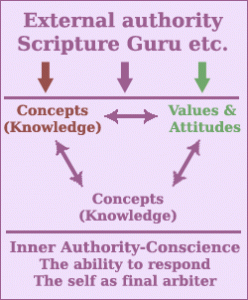Last edited:
Values and Authority
Within most books on Hinduism, little is written explicitly on Hindu values and attitudes. Since values are subtle, and exhibited largely through behaviour, most texts explore them thematically, through topical issues.
The relationship between concepts, values, and practices, all informed by authority.
However, it is useful to study Hindu values systematically, and it is particularly rewarding to examine how they inter-relate with concepts and practices (as shown to the right). According to Hindu thought, the dynamics between these three items include the following;
- Concepts significantly inform values (see Values and Concepts).
- Values are demonstrated through practices (see Values in Practice).
- Nurturing suitable values, through practice of morality and spiritual discipline, is necessary to assimilate knowledge.
Although Hinduism is an accommodating tradition, its values are not entirely fluid. They may not be constrained by a single or static set of beliefs, but they are guided by the need to comply with universal principles, and the desire to discern truth from illusion (maya). In exploring this topic, therefore, it is useful to recognise that Hinduism has its own distinctive perspectives, as we list below:

Two important authorities – spiritual (the brahmana) and social (the kshatriya) – who should work co-operatively. Values are closely connected to the execution of dharma in terms of specified duties, both spiritual and socio-religious.
Sanatana-dharma supports the ideal of shared values, the spiritual virtues that are recognised by all authoritative religious traditions. These characteristics are considered to be inherent within the heart of all beings, and to be invoked from within rather than imposed from outside.
Varnashrama-dharma allocates different specific values to the respective varnas and ashrams, often as stepping-stones towards ideal character (represented by brahmanas and sannyasis).Values are often transmitted through story, illustrating the dynamics between knowledge, character, and the ability to execute dharma and respond to situations.
Hindu values may differ from those currently prevalent in the UK. They often challenge “political correctness,” and may even differ from those taught within schools. Notions of authority are considered important to ensure that values aren’t unduly swayed by popular sentiment.

